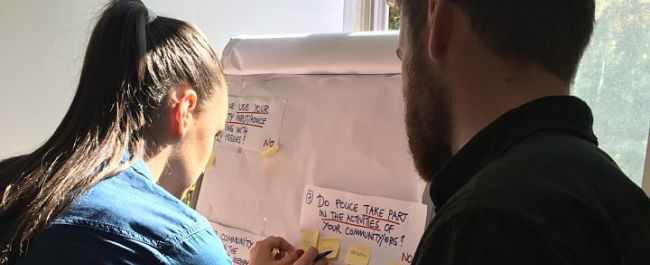Enhancing the capacity of marginalised groups to make peace processes more successful

PeaceCapacity resulted from the findings of the EU-CIVCAP project, which assessed EU capabilities for conflict prevention and peacebuilding, and within this, capacity building.
About the research
PeaceCapacity resulted from the findings of the EU-CIVCAP project, which assessed EU capabilities for conflict prevention and peacebuilding, and within this, capacity building.
Capacity building refers to efforts to strengthen organisations’ and individuals’ capacities to meet the challenges of achieving sustainable peace and include trainings, workshops and mentoring activities. Those running these activities are referred to as ‘capacity builders’. While capacity building exercises are expensive, they are considerably ‘cheaper’ than dealing with the consequences of conflict. However, whilst targeting the ‘local’, capacity building activities often privilege powerful groups. Therefore, ‘local’ solutions may reinforce existing power structures, and exclude groups that are already marginalised, making interventions less likely to succeed.
To overcome this, we ran three training workshops for marginalised actors in Hargeisa, London (for diaspora) and Pristina, and produced a catalogue of lessons identified, policy briefings like this one for policy-makers, and a training handbook for local actors.
Policy implications
- Capacity builders should adapt initiatives to the particularities of the context to ensure that training materials remain relevant to local participants. Where possible key local participants and organisations should be consulted during the design and delivery phases.
- Capacity builders should improve the chances of an activity becoming sustainable by ‘training the trainer’, or at least including in their programmes detailed information about how participants can train other people to use existing training materials.
- Capacity builders should be aware of the potential of new technologies, particularly social media, and should exploit this potential to promote inclusiveness and increase the capacity of marginalised groups. They should also mitigate/minimise the risks associated with the use of these technologies, especially where it can lead to further exclusion.
- Evaluation and effective learning mechanisms should be put in place. Capacity building programmes must develop consistent monitoring mechanisms to facilitate continuous improvement and reporting, and to track progress over time. Evaluation mechanisms also support changes to capacity building activities where participants have identified problems regarding the content or methodology.
Key findings
Conflict prevention initiatives should emphasise capacity building. Capacity builders must reflect on the above recommendations when designing new initiatives. Our recommendations were formulated from the following findings:
- Understanding the local context and ensuring local ownership, through the practical and financial support of these processes, is crucial.
- Our workshops required adaptation for Pristina, Hargeisa and London, as in each instance the participants had different levels of capacity in different areas, and therefore were interested in some topics more than others. This also related to their differing demographic compositions.
- ‘The local’ is often conceptualised in a way that marginalises certain groups; we were challenged throughout to attract workshop participants who represented a broad range of society, and who were often excluded and not regularly attending similar workshops. This was only possible through key intermediary local gatekeepers.
- In all instances, the participants were most interested in the positive and negative effects of new technologies, in particular social media.
- Finally, our evaluation process of testimonial collection has revealed a series of lessons identified for our project, and for future capacity building activities.
Policy Briefing 57: May 2018
Contact the researchers
Dr Ana E. Juncos, Reader in European Politics, University of Bristol
Further information
For more information about PeaceCapacity, see https://peacecapacity.net/. PeaceCapacity’s Catalogue of Lessons Identified is available at https://peacecapacity.net/lessons/.
Jester, N., G. Algar-Faria and A.E. Juncos (2018), Peacebuilding and Local Ownership: A Handbook for Practice, Bristol: University of Bristol.
Ejdus, F. and A.E. Juncos (2018), ‘Reclaiming the local in EU peacebuilding: Effectiveness, ownership, and resistance’, Contemporary Security Policy, 39(1), 4–27.
Juncos, A.E., G. Algar-Faria and N. Jester (2018), ‘Enhancing the capacities of marginalised groups for inclusive peace processes’, PeaceCapacity Policy Briefing PC1/18, February.
Twitter: https://twitter.com/peacecapacity
Facebook: https://www.facebook.com/peacecapacity
Funding information
PeaceCapacity has received funding from the University of Bristol’s ESRC Impact Acceleration Account. The content reflects only the authors’ views; the University of Bristol and the Economic and Social Research Council are not responsible for any use that may be made of the information it contains.
PeaceCapacity is based on research undertaken by the EU-CIVCAP project. The EU-CIVCAP project has received funding from the European Union’s Horizon 2020 research and innovation programme under grant agreement no.: 653227. The content reflects only the authors’ views, and the European Commission is not responsible for any use that may be made of the information it contains.
Authors
Ana E. Juncos, Gilberto Algar-Faria and Natalie Jester (University of Bristol)
Related briefings
Preventing and responding to conflict: Improving EU civilian capabilities must be prioritised




